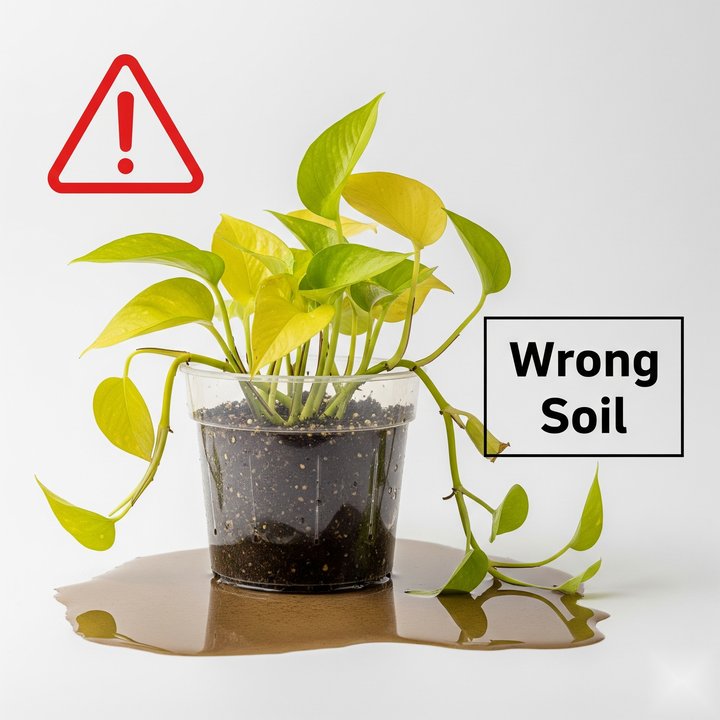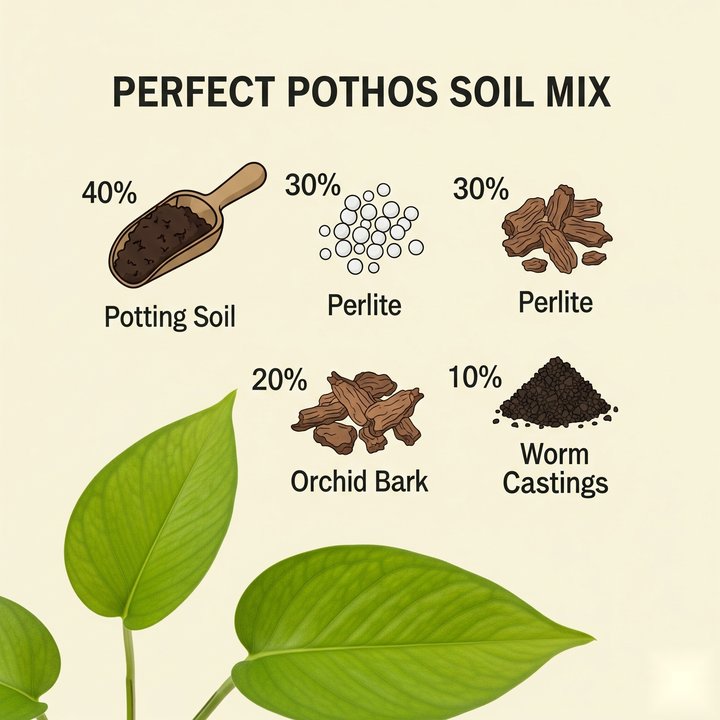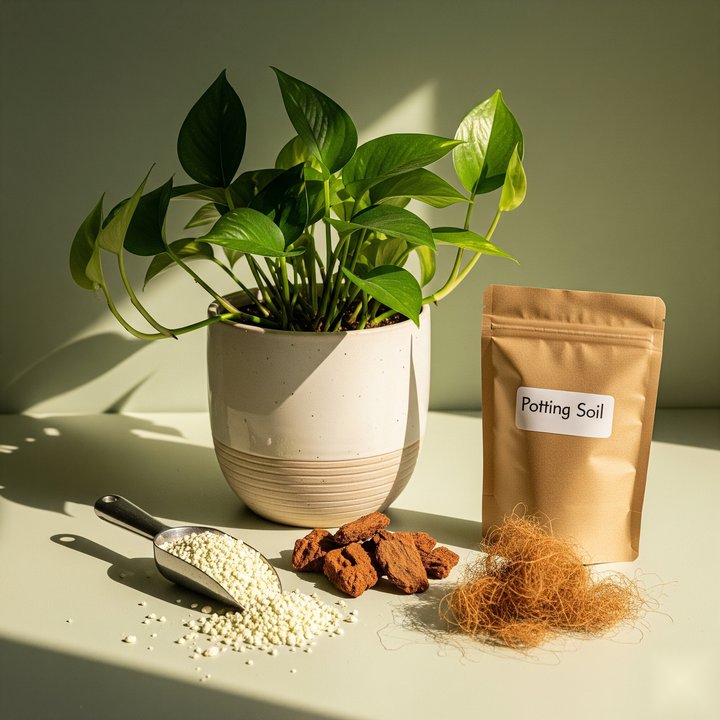If you’re a new plant parent wondering, “What’s the best soil for my pothos?” — you’re not alone. I asked that exact question when I first brought home a neon pothos gifted to me on Mother’s Day. It was love at first sight — those bright chartreuse leaves brought a pop of joy to my windowsill. But I quickly realized that “well-draining soil” meant more than just tossing it into a random potting mix.
This post is your complete, no-nonsense guide to choosing (or making!) the best pothos soil, including soil mix ratios, ingredients, tips, and common pitfalls to avoid.
Why Soil Matters for Pothos

Pothos (Epipremnum aureum) are often praised as “unkillable” houseplants. And while they are resilient, the wrong soil can cause problems like:
- Root rot
- Yellowing leaves
- Stunted growth
- Droopy or wilting vines
Pothos need light, airy, and well-draining soil that retains just enough moisture to keep roots hydrated — but not soggy.
What Kind of Soil Do Pothos Like?
Pothos are tropical, vining aroids. In their native habitat, they grow in loose, rich forest soil filled with organic matter and chunks of bark, leaf litter, and other debris.
Ideal Soil Characteristics:
- Well-draining: Allows excess water to flow out easily
- Moisture-retentive: Holds some water, but not too much
- Aerated: Oxygen must reach the roots
- Nutrient-rich: Supports healthy foliage and growth
My Go-To Pothos Soil Mix Recipe (Tested & Loved)

After years of experimenting, here’s my favorite DIY pothos soil mix recipe — it’s balanced, beginner-friendly, and works for most pothos varieties.
Basic Pothos Soil Mix Ratio:
- 40% Indoor Potting Soil
- 30% Perlite
- 20% Orchid Bark (or coconut husk chips)
- 10% Worm Castings
Why This Works:
- Potting soil provides nutrients and moisture retention.
- Perlite keeps the soil light and improves drainage.
- Orchid bark mimics chunky rainforest substrate.
- Worm castings offer gentle organic nutrients.
Tip: If you’re using a moisture-retaining potting mix (like Miracle-Gro), increase the perlite to 40% for better drainage.
Store-Bought Alternatives (If You’re Not Into Mixing)
If you don’t feel like becoming a soil scientist, no worries. These are great off-the-shelf options:
- Miracle-Gro Indoor Potting Mix (add perlite or bark!)
- FoxFarm Ocean Forest (rich but heavy, cut with perlite)
- Houseplant soil + added perlite – always aim for a chunky, airy feel
You can also find aroid soil mixes on Etsy or specialty stores — these are designed specifically for plants like pothos, philodendron, and monstera.
Special Considerations for Pothos Varieties
Some pothos varieties are more finicky than others:
Neon Pothos:
- Needs extra drainage — they’re prone to root rot
- Add more perlite or pumice to your mix
Golden Pothos & Jade Pothos:
- Very forgiving, will grow in almost any mix
- Still thrive better in an airy substrate
Marble Queen Pothos:
- Slower growers, appreciate a nutrient-rich mix
- Worm castings and coco coir help here
Can You Use Cactus or Succulent Mix for Pothos?
Surprisingly… yes, with modifications.
Cactus mixes like Bonsai Jack or Espoma Cactus Mix are extremely well-draining and contain very little organic matter. On their own, they’re too dry for pothos.
How to Fix It:
- Add 30–40% potting soil or coco coir
- Include worm castings for nutrients
Common Soil Problems & Fixes
Even with the right mix, things can go wrong. Here’s what to look out for:
| Problem | Likely Cause | Fix |
| Yellow leaves | Overwatering or poor drainage | Repot in well-draining mix |
| Drooping or wilting | Compacted or waterlogged soil | Add perlite & repot |
| Stunted growth | Nutrient deficiency | Add worm castings or organic fertilizer |
| Foul smell | Root rot | Remove affected roots and repot |
Pro Tip: After watering, your soil should feel moist but not soggy — and water should drain from the pot within 30 seconds.
How to Repot & Separate Pothos Safely
Yes, you can divide your pothos! But be gentle — those roots don’t like rough handling.
Steps:
- Water your plant the day before (makes soil soft).
- Remove from pot and gently tease apart sections.
- Trim any damaged roots.
- Pot each section in fresh pothos potting soil.
Wait at least 2–3 months after bringing your plant home to repot — let it adjust first!
My Real-Life Pothos Soil Story
I’ve had pothos in every kind of container — from water jars to coir planters. At first, I treated them like succulents and used a sandy, dry mix. Big mistake! My neon pothos got yellow leaves and stopped growing.
After switching to a chunkier, more balanced mix (and adding bark and worm castings), I noticed immediate improvement. The leaves perked up, growth exploded, and it finally looked like the Pinterest-worthy plant I dreamed of.
Soil Tips for Happy Pothos
Use pots with drainage holes
Repot every 1–2 years to refresh soil
Never let them sit in water — empty saucers!
Feed monthly during growing season with diluted fertilizer
Mix soil in a clean tub and moisten lightly before potting
Frequently Asked Questions (People Also Ask)
What is the best potting soil for pothos?
A mix of potting soil, perlite, and orchid bark works best. You can also buy aroid mixes or amend basic potting soil.
Can I use succulent soil for pothos?
Yes, but you should add organic material like potting soil or coco coir to help retain moisture.
Should I repot my pothos after buying it?
If it’s rootbound or in soggy soil, yes. Otherwise, wait 2–3 months so it can acclimate.
How do I know if my pothos soil is bad?
If it smells musty, stays wet for days, or feels like a solid block — it’s time to refresh your soil.
Is it okay to propagate pothos directly in soil?
Absolutely. Just keep the soil lightly moist and warm while the roots establish.
Final Thoughts: Don’t Stress Too Much
Pothos are wonderfully forgiving. Even if your first soil mix isn’t perfect, they’ll likely survive. With a little tweaking, observation, and patience, you’ll find what works best for your environment.
If you’ve struggled with pothos in the past, don’t give up! I once killed two neon pothos before I found the right soil recipe — now my entire windowsill is a pothos jungle.
Happy planting

